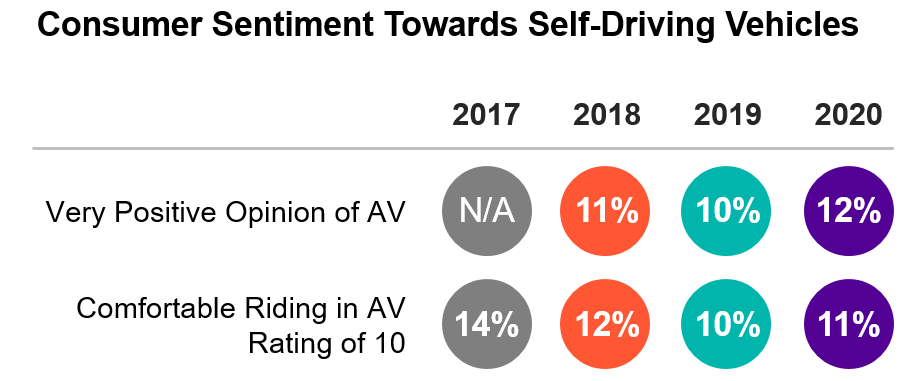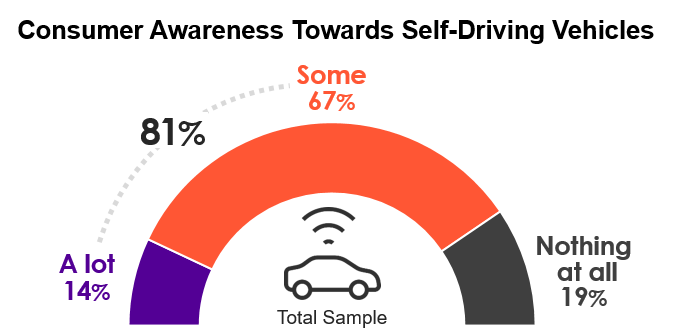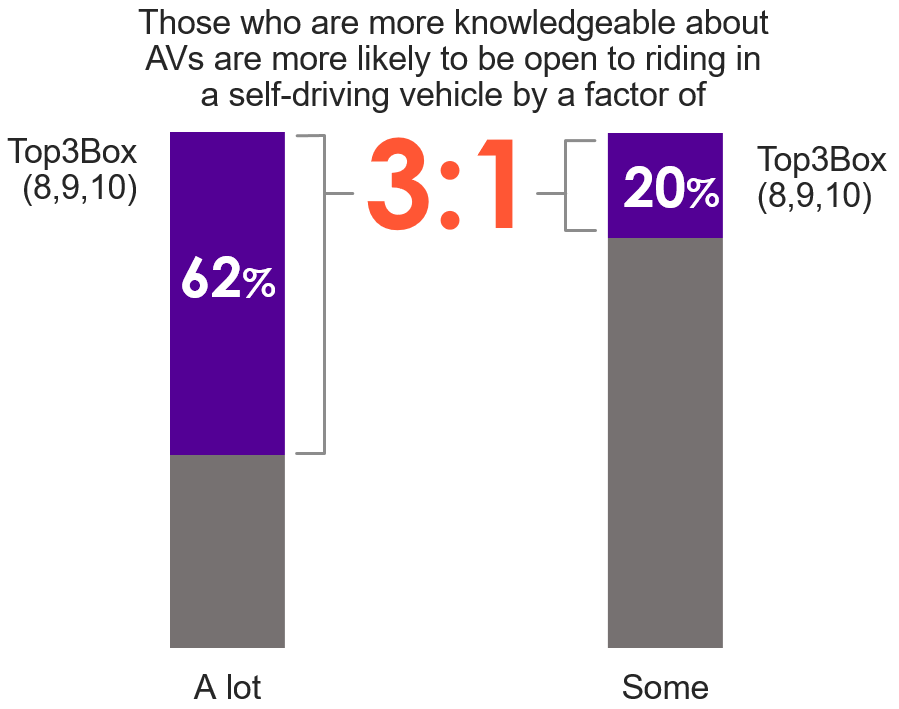
A decade has passed since I first learned about Google’s self-driving car and its intentions for redefining mobility. Honestly, at the time, I was not sure what to make of it but, now, I can confidently say it feels like a roller coaster ride of a lifetime. The anticipation of a world with self-driving cars is absolutely exhilarating. But, at the same time, unexpected twists and turns detract from the excitement of the journey and cast an ominous cloud of doubt over the realization of self-driving vehicles.
Growing Industry Momentum for AVs Despite Low Consumer Demand
Recently, there has been a lot of activity in the world of autonomous vehicles (AV). Important players are building momentum as they diligently ascend the massive incline to be among the leaders to offer a self-driving vehicle that is not only accepted but embraced by the public.
Waymo recently announced it is going fully driverless, meaning no safety driver on board. General Motor’s Cruise was recently awarded a permit from the California Department of Motor Vehicles to test five fully driverless vehicles on public roads in San Francisco. Of course, we can’t forget about Tesla, which recently released its Full Self-Driving software to a limited group of owners who are willing to give the beta version a try. The release of the over-the-air software may be to the chagrin of other drivers who have to share the road with these brave Tesla trailblazers.
If this isn’t exciting—or perhaps scary—enough, there is a broad range of AV developments underway targeted for commercial applications. This includes last-mile delivery of goods, groceries and medicine on one end of the spectrum to autonomous long-haul trucking on the other end. The recent partnership between Waymo and Daimler Trucks speaks to the viability of launching such commercial applications. Building on this momentum, Ford has announced it is targeting 2022 to launch an autonomous commercial business in partnership with Argo AI using Ford Escape Hybrids.
It is so exciting to witness these innovative players achieve such impressive milestones, which are definitely poised to redefine mobility. Interestingly, however, the momentum in development is not in response to consumer demand for self-driving vehicles.
Lacking Consumer Enthusiasm and Trust in AVs
Escalent has been tracking consumer sentiment towards self-driving vehicles for years and little has changed. Only about 1-in-10 have a very positive opinion of self-driving vehicles and are completely comfortable riding in an autonomous vehicle.

This absence of enthusiasm is not a reflection of awareness, as most people (81%) have heard or seen at least something about the development of self-driving cars (67% have heard something/14% have heard a lot).

It is about a lack of trust in the technology. People are not convinced that the technology will keep them and their loved ones safe from harm. The most important topics consumers want to learn about are the safety record/test results of the AV and how vehicle occupants will be safe while riding in it.
Quantifying the Lift in Positive Consumer Attitudes towards AVs through Education
Our research also speaks to the importance of educating the public about the technology and the impact these efforts have on improving consumer attitudes toward AVs. The proportion of people who have a positive opinion of AVs is 2.5 times greater among those who have seen or heard “a lot” of information about self-driving vehicles compared to those who have seen or heard “some” information.

A similar story emerges for being open to riding in a self-driving vehicle. Those who are more knowledgeable about AVs are more likely to be open to riding in a self-driving vehicle by a factor of 3:1.

Understanding the Multi-Dimensional Aspect of Trust is Critical for Building Acceptance
As important as education is to adoption, education alone won’t be enough. Companies need to have a multi-stage strategy that is cost efficient and highly effective in earning the public’s trust. This will be no small feat as trust, as a construct, is complex.
In the race to earn people’s trust, AV companies need to account for the multi-dimensional aspect of trust to ensure a leadership position. Building trust in AVs is a process that is influenced by several factors including: pre-existing knowledge, personal experience, situational factors, demographics and culture, as well as personality traits.
Education campaigns, human-machine interface (HMI) design and human-robot interactions (HRI) must take into consideration how this constellation of factors express themselves across various segments of consumers. The level of vulnerability felt by a mother with small children riding in an AV is likely to be quite different than for a young man out on the town with his buddies. As such, education messaging, marketing communications, and interior and exterior design of AVs must be reflective of how different people interpret information and behave during interactions with a self-driving vehicle powered by artificial intelligence. Designing through this lens will enable trust, thus leading to acceptance and adoption of self-driving vehicles.
Building Trust in Autonomous Technology Is This Decade’s Challenge
As AV innovators renew their efforts for the years to come, it is not too early to start the process of building trust in AV technology. Earning the public’s trust is about getting the interaction right. In the case of AVs, the interaction is not only with the user/rider—it is also about the interaction with other vehicles, pedestrians, bicyclists and infrastructure. In order for people to trust the technology, it’s imperative that companies understand the factors that influence how people come to trust autonomous vehicle technology. It’s important to understand how culture, personality traits and other key factors influence trust so companies can deliver experiences that resonate with a highly diverse audience.
Given the billions of dollars already invested in the next generation of mobility, along with the support of the federal government, the industry is not likely to abandon its efforts given the huge potential for saving lives and reducing emissions.
I look forward to an even more exhilarating roller coaster ride that promises to deliver a cascade of memorable experiences over the next decade of AV development.
Escalent’s automotive team works with mobility companies of all kinds to craft winning strategies and find success as they navigate disruption and business transformation. If you would like to learn more about how we can help you come out on top in good times and bad, please send us a note.
Escalent interviewed a national sample of 1,000 consumers aged 18 and older between September 10 and September 25, 2020. Respondents were recruited from the Dynata opt-in online panel of US adults and were interviewed online. Quotas were put in place to achieve a sample of age, gender, income and ethnicity that matches the demographics of the US population. The data have a margin of error of 3 percentage points at a confidence level of 95%. The sample for this research comes from an opt-in, online panel. As such, any reported margins of error or significance tests are estimated, and rely on the same statistical assumptions as data collected from a random probability sample. Escalent will supply the exact wording of any survey question upon request.








